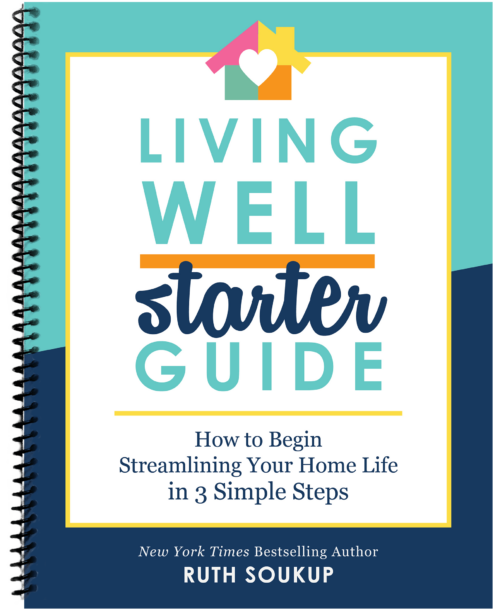Feeling like your finances are out of control can be downright scary. Don’t miss these 8 smart ways to get back on track and stop worrying about money!
Worrying about money can get downright scary—and facing our fears about our financial situation can be stressful to even start to think about. But there’s a better answer than lying in bed at night fretting about bills we need to pay, dodging calls from collection agencies and avoiding opening our bills because we’re too scared to even look at them.
Not so long ago, my husband and I were at a make-or-break point when it came to finances. I was spending too much and living beyond my means, and as a result he was stressed to the max, and we were fighting all the time. I wasn’t trying to ignore it, but looking back, I realize I wasn’t being completely honest with myself about where we were financially. I was having a hard time exercising self-control when it came to spending…and we were paying the price.
Eventually, we all come to a point where we have to face reality—even when it seems like the hardest thing in the world.
Stop Worrying About Money
If you’re worried about your finances, know there’s help available and you’re not alone! Here are some things you can do RIGHT NOW to stop worrying about money and lessen your money worries to come out on top.
1. Assess Your Finances
The first step to overcoming your financial worries is to assess your finances. So many of us avoid looking at “how bad” it is because we’re scared. We don’t know how to solve our money woes, so we try to ignore it and put it off.
It’s time to address your financial situation and get a handle on what you’re looking at before you start to tackle it. Gather your bills together. Log in to your bank accounts and your mortgage company. Figure out what you owe on your cars and credit cards. Look at your student loan payments, the tuition bills for your kids and any medical bills you have outstanding. Bring it all to one place.
Once you’ve gathered all of that financial data together, sit down and take a look at it. Write down how much you owe in each case, what the terms of the loans and bills are and how much the minimum payments are for each. Don’t be daunted by it, even if it’s a large amount.
To get started, you have to get a handle on where you’re starting out.

2. Make a Budget
Making a budget can be challenging, especially if it’s not something you’ve done before. You’re going to want to figure out all of your monthly bills. Look at what you spend regularly on things like entertainment, food, gifts and pets. Take a look at your full financial picture and then work on what you can realistically tackle and make headway on.
Part of working on your budget is looking at your payments to insurance, cable, phone and other utilities and services. Call up your providers to see if you can reduce any of your monthly amounts. Think of ways you can creatively reduce your bills. Can you give up cable and just rely on Netflix or a Roku? Can you switch out to a slightly-lower-speed Internet? Can you raise your insurance deductible by a manageable amount and lower your monthly premiums?
Once you’ve created your budget, make a commitment to stick to it. Your budget shows the picture of what you can realistically live on and what you can afford to spend each month. If you’re constantly going over your budget, you need to reduce your spending somewhere or do a reassessment on your priorities. It might mean sacrifices, but it will be worth it when you can relax and let go of your financial worries.
3. Communicate with Your Spouse
There are many hard conversations that couples need to have—and finances are definitely one of them. Sometimes couples are on different pages when it comes to spending and saving. You might not agree with the way your spouse prioritizes their money; you might even resent them for not making enough or vice versa. Sitting down with your spouse and addressing your concerns will help bring them to light and resolution.
If you share finances as a couple, look at what you’re both spending and appoint one of you as the “point person” for your budgeting. All purchases and spending should be decided upon together, and the two of you should meet regularly to assess where you are and how things are going.
In some couples, one person runs the finances and the other just sort of hopes for the best. While this can work for some, if you find you’re worried about your finances, don’t go it alone. Get your spouse in on what your concerns are and how you can work together to overcome challenges. Make it a team effort.
4. Reign in Spending and Take a Break
If you’re ready to get started tackling your financial worries, give yourself a boost by trying a “no spend month.” Not only will it get you to shift into “savings mode”, but it’ll give you a boost of confidence when you see just how far you can go without spending a thing. This one’s certainly not easy, but it’s not impossible—and it’s SO worth it!
When you go on a month of zero spending, get creative and use up what you have on hand. Make meals from the foods you have in your cupboards. Put away your credit and debit cards and see how long you can go without having to swipe them. Use up any gift certificates or freebies you have on hand, and see if you can swap or sell things to meet your needs.
When you successfully complete a month of zero spending, you’ll be amazed at how much it reprioritizes your buying mentality and changes how you look at things when you go to the store! You’ll feel more proactive about how you’re managing your money and proud of sticking to it throughout the month.

5. Try a Debt-Reduction Plan
If your money worries are keeping you up at night and you’ve looked at your budget and still don’t know how you’re going to make headway, try embracing a plan to reduce your debt. Dave Ramsey recommends saving $1,000 for emergencies (to avoid going into additional debt when the furnace goes out or the car needs new tires) and then trying the “debt snowball” approach.
The way a debt snowball works is you arrange all of your debts from largest to smallest. Pay off your smallest debt first, and once it’s paid off, the money you were paying toward it is now applied to your next smallest debt (moving up and paying off your debts in a “snowball” effect).
It’s a great way to really see progress on your payments! It can be satisfying and a big boost to know you’ve paid something off totally, and you’ll never have to worry about it again. Continue on your debt reduction plan until you’ve paid down all your debts (except your mortgage), and you’re on your way to financial freedom!
6. Stick to Your Goals and Give them Time
I’m sometimes impatient…how about you? I wish I could just wave a magic wand and be done and on to the next thing. This is where tackling money worries gets really tough. Keep in mind, when it comes to debt, chances are it didn’t happen overnight. Accumulating debt is usually a long, slow process of spending a little more than we had coming in. There were probably emergencies that crept up and unforeseen events. Paying off our debt is the same way: it’s not something immediate and can be a long, slow process.
Keep your eye on the prize and revisit your budget regularly. Keep a close eye on the progress you’re making and congratulate yourself on the little victories along the way. Just like setting any goal, we have to take small steps toward the final outcome. If it’s too daunting to get to the finish line, just watch for the next mile marker.
By tackling the toughest things first—facing and assessing your finances, making a budget and figuring out a debt plan, you’re already eating the frog and getting the hard stuff out of the way. Now that you have a plan, all you need to do is keep at it and stay the course.
7. Learn to Say No
One of the biggest keys to getting organized, taking back your schedule or doing any hard job is learning how to say no to the obstacles in your way. Getting out of debt is no exception. In fact, debt is usually related to the problem of saying yes too much. To reverse your financial situation, you have to learn to say no.
This means you might have to teach your kids about finances and some important lessons about needs vs. wants. They might have to think creatively when it comes to birthday gifts and entertainment. Focus on the joy in experiences rather than accumulating gifts and toys.
You may also have to rethink your approach to social plans. Let your friends know you’re trying to reduce your debt and avoid spending money. Ask them if, instead of going out for drinks or coffee, you can enjoy a walk around a park with them. Join a book club through your local library or watch a movie together at your house rather than the theater. Arrange a clothing swap, a craft afternoon or other activities where everyone can bring a dish to share, and you can still stay social while not spending a dime.
8. Get Expert Help
In the end, if you truly can’t get a handle on your finances, and you’re worried you’re going to lose your house (or worse), it’s time to seek the advice of a financial adviser or expert. Most credit unions offer financial advisers for free to members. They can help you examine your credit score, work out deals with creditors and consolidate or work on other ways to tackle your debt. Remember your goal: to stop worrying about money.
You can often defer student loan payments in times of hardship, and even creditors will work with you in cases of job loss, health crisis or other major trials. Many churches also offer financial guidance to their members and can help you get in touch with family services, food pantries and other programs to assist you through a difficult time.
You may need to temporarily pick up some extra work, have your spouse pick up another job or find a way to earn money from home. There are many opportunities to build up your finances and make ends meet in times of trouble and crisis. Ask yourself if you really need two cars. If you have a lot of large items, like sports equipment, furniture or electronics, consider selling a few things to generate some extra cash. Pick up some odd jobs (babysitting, cleaning or doing yard work) to earn some money. Think of other ways you can boost finances to get you over this hurdle.
Whatever you’re facing financially, don’t lose hope! All of us can turn things around and get our heads above water if we try. You might be going through a rough time, but if you set your goals and take small steps to get yourself back on your feet, you can do it!
A Little Bonus Tip
A great way to keep track of your budget and make sure you follow it each month is by using a planner that incorporates your budget right into your monthly planning, like our Living Well Planner®. It has budgeting pages and expense trackers so you can stay on track and monitor your progress.

To recap, here are ways you can Stop Worrying About Money:
1. Assess Your Finances
2. Make a Budget
3. Communicate with Your Spouse
4. Reign in Spending and Take a Break
5. Try a Debt-Reduction Plan
6. Stick to Your Goals and Give Them Time
7. Learn to Say No
8. Get Expert Help
Other similar articles:
- How to Break Out of Your Financial Slump & Make Your Money Work for You
- Your Biggest Money Problems Solved
- Helpful Resources to Save Time and Money
PIN FOR LATER:

abc affiliate
TAKE BACK CONTROL OF YOUR HOME LIFE
 Ever feel like you just can't keep up? Our Living Well Starter Guide will show you how to start streamlining your life in just 3 simple steps. It's a game changer--get it free for a limited time!
Ever feel like you just can't keep up? Our Living Well Starter Guide will show you how to start streamlining your life in just 3 simple steps. It's a game changer--get it free for a limited time!
If you love this resource, be sure to check out our digital library of helpful tools and resources for cleaning faster, taking control of your budget, organizing your schedule, and getting food on the table easier than ever before.










It’s also worth mentioning that reducing your energy consumption can not only benefit the environment but also significantly lower your monthly electrical bills, providing you with greater financial peace of mind. Therefore, it’s advisable to schedule a home energy audit. Professionals can identify areas of energy waste and recommend improvements customized to your home’s specific needs.
I have thought so many times of entering the blogging world as I love reading them. I think I finally have the courage to give it a try. Thank you so much for all of the ideas!
Great information. Thanks for the post, Ruth! Really enjoyed the reading.
Yes!! We’ve been on our debt-free journey for several years now and while we’re still in the home stretch, it’s been an amazing, life-changing experience. We had to first get honest about where we were and then make a plan to get to where we wanted to be. Yes, the life-style change can be hard at first, but once you settle into your new norm and start seeing your debt payoff wins(!) it’s hard to imagine ever going back.